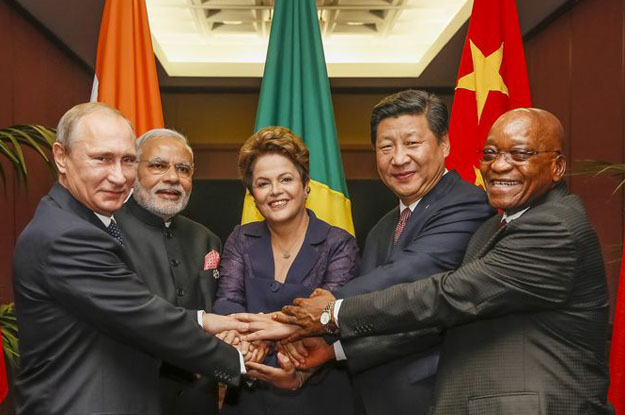Almost a decade ago, in 2007, Brazil’s President Luiz Inácio Lula da Silva was one of the star speakers at the World Economic Forum in Davos. Investor money was pouring into one of the world’s most exciting emerging markets, and Foreign Minister Celso Amorim – who would go on to be called the “world’s best foreign minister” by Foreign Policy – was beginning to expand Brazil’s economic and diplomatic presence across the globe.
Never before had a South American country established such a broad network of embassies, rivaling that of established powers. A year earlier, Amorim had initiated regular meetings with his counterparts from Russia, India and China to discuss how the BRIC countries could strengthen cooperation and jointly address global challenges. The BRICS grouping (since 2010 with South Africa) quickly became one of the most important innovations in global affairs since the turn of the century, calling on established powers to adapt global structures to new realities.
Fast forward to 2016, and Brazil’s economy is one of the worst performing in the world, the nation is led by a scandal-prone interim government and shaken by protests, austerity measures and a staggering corruption investigation that threatens to wipe out much of Brazil’s political elite. International observers consider the BRICS a thing of the past, and many Brazilian analysts believe it is time to leave.
They couldn’t be more misguided.
Talk of leaving the BRICS fails to recognize the ample strategic gains BRICS membership produces for Brazil, and why anything but treating it as a priority (for example, by staying away from the summit) would be a serious mistake. There are three reasons why the grouping is essential for Brazil’s strategic interests.
First, and most importantly, BRICS membership provides Brazil with direct and institutionalized access to the political leadership in New Delhi and Beijing – a privilege it would not necessarily enjoy automatically on a yearly basis. Despite lower growth figures, the Chinese economy is expected to grow at or above 6 percent in 2016 and 2017. India performs even better and will grow faster than China. The IMF predicts that China and India are expected to contribute more than 40 percent of global economic expansion until 2020 – the United States, by comparison, only ten percent. Today, there is already more private wealth in Asia than in Europe, and China, irrespective of its current slowdown, can be expected to overtake the U.S. as the world’s largest economy.
Brazil must do far more to adapt to this new reality, and there is no question that Brazil’s future will depend in large part on Asia. The BRICS grouping matters in this context because it consists of far more than just yearly presidential summits. Rather, it includes more than 15 minister-level meetings per year, which help promote intra-BRICS cooperation ranging from agriculture and education to finance and science and technology – not to mention the BRICS-led New Development Bank.
Second, the next BRICS Summit in India in October is a unique chance for interim President Michel Temer to articulate how he seeks to overcome Brazil’s current difficulties. With Brazil’s reputation in tatters, Asian investors need to be reassured that the ongoing corruption investigation is a step in the right direction, which will ultimately make Brazil a more investor-friendly country. Temer therefore should be accompanied by the leading members of his economic team, who should visit investors in several Asian financial centers after the summit.
Finally, Brazil’s membership in the BRICS grouping, along with its founding member status in the Asian Infrastructure Investment Bank (AIIB) and the BRICS-led New Development Bank, are important signals that the country’s global strategic presence established in the first decade of the 21st century is permanent and won’t be substantially affected by the current crisis. The institutions named above are symbols of a wider shift of power towards Asia that will impact Brazil far more than most are aware.
While China turned into Brazil’s most important trading partner in 2009, Brazilian elites in politics, business, media and academia are still woefully ignorant of China and Asia as a whole. Far too few Brazilian diplomats speak Chinese, and young students at Brazilian elite universities still prefer to spend their exchange semester in Barcelona or Paris rather than Beijing or Shanghai. There is not a single double degree program between a Brazilian and a Chinese university, not a single internationally recognized sinologist in Brazil, and rather than posting correspondents in China, many Brazilian newspapers buy China-related content from newspapers abroad.
This shows that Brazil is among the large countries least prepared for the advent of an Asia-centric world order. Considering China’s growing influence in South America, this lack of preparedness creates serious strategic risks. How does China’s growing influence in Venezuela affect Brazil’s national interests? How should the region as a whole respond to China’s role? None of these issues has even begun to be addressed seriously. The fact that some thinkers (particularly among Latin America’s left) still regard China’s growing influence in the region as positive simply because Beijing is seen as Washington’s adversary shows how incipient the debate in the region still is – as the African example shows, it is far more complex than that.
Regardless of the ideological orientation of its government, any country in the world today must build up the necessary knowledge to meaningfully engage Asia (and especially China), soon to be the economic center of world. With the BRICS grouping, Brazil is lucky enough to be part of an institutionalized forum that can facilitate that process. It must do everything possible to preserve it.
–
Stuenkel is a contributing columnist for Americas Quarterly and teaches International Relations at the Getulio Vargas Foundation in São Paulo. He is the author of The BRICS and the Future of Global Order (2015) and the forthcoming Post-Western World (2016).








